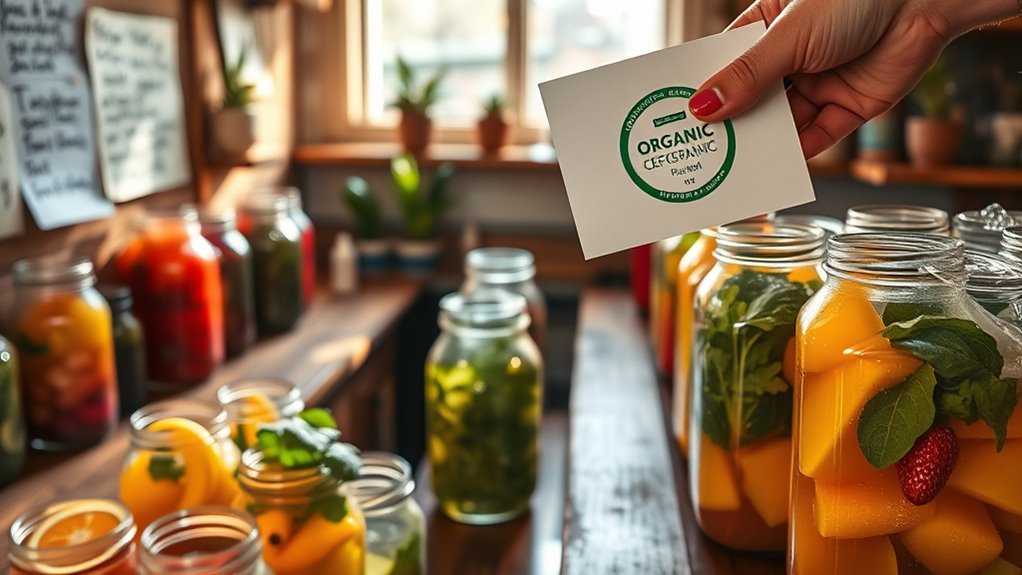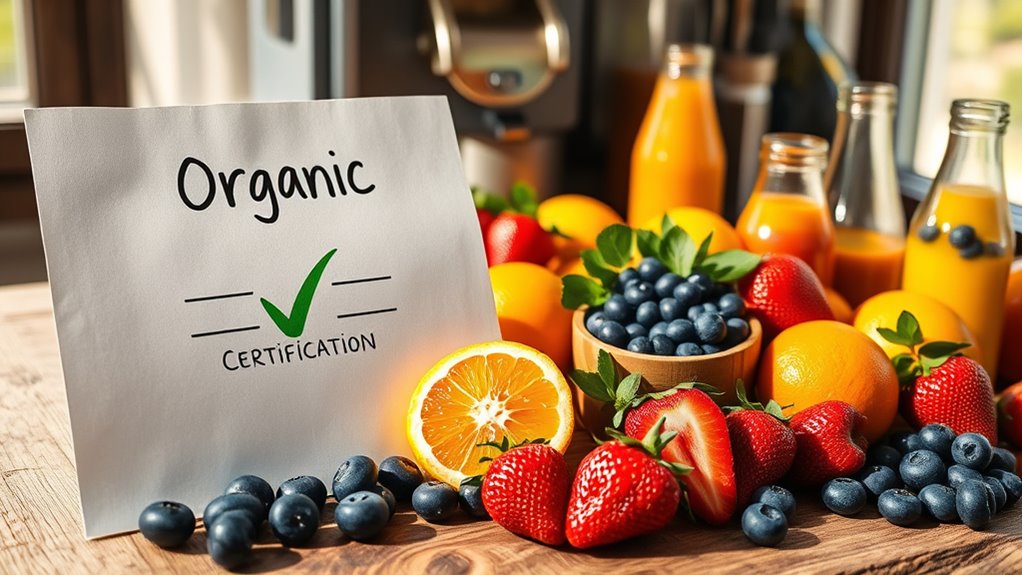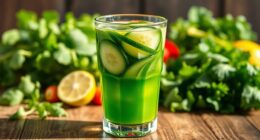Getting organic certification for your small juice startup proves your commitment to natural, sustainable products and can set you apart in a crowded market. It guarantees your ingredients aren’t grown with synthetic pesticides or GMOs, building trust with customers. Using eco-friendly packaging and sharing your story about sourcing and sustainability enhances your brand. Staying compliant and consistent is key, and exploring these steps further can help you confidently achieve and maintain your organic status.
Key Takeaways
- Obtain certification from recognized organic authorities to validate your juice’s natural and high-quality standards.
- Use eco-friendly, sustainable packaging to align with organic principles and enhance brand credibility.
- Share your journey toward organic certification and sustainable sourcing through storytelling and transparent marketing.
- Leverage certification badges in branding to build consumer trust and differentiate in the competitive market.
- Educate your team on organic standards and maintain compliance to ensure ongoing certification and market reputation.

Are you wondering how to prove your small juice startup’s commitment to quality and sustainability? One of the most effective ways is through obtaining organic certification. This certification not only validates your product’s natural integrity but also signals to consumers that you prioritize health, environmental responsibility, and high standards. When you pursue organic certification, you’re showing customers that your juice is made from ingredients grown without synthetic pesticides, fertilizers, or genetically modified organisms, reinforcing your dedication to purity and sustainability.
To maximize the impact of your certification, it’s essential to align your packaging and marketing strategies with your organic values. Sustainable packaging plays a pivotal role here. Opt for eco-friendly materials—such as biodegradable bottles, recycled paper labels, or compostable cartons—that reflect your commitment to reducing environmental impact. When customers see your thoughtfully chosen packaging, it reinforces your message of sustainability and transparency. Incorporate messaging on your labels that highlights your use of sustainable packaging and organic ingredients, making it clear that every aspect of your product supports eco-conscious practices.
Using eco-friendly packaging reinforces your commitment to sustainability and transparency.
Your marketing strategies should capitalize on the authenticity that organic certification offers. Use clear, compelling storytelling to communicate your journey toward organic certification, emphasizing your efforts to source local, organic ingredients and utilize sustainable packaging. Share behind-the-scenes content about your production process, showcasing how you minimize waste and reduce your carbon footprint. Highlight your certification badge on your website, social media, and packaging to build trust and credibility. People want to support brands that genuinely care about their health and the planet, so be transparent about your certification process and what it means for your products.
Additionally, leverage your certification in promotional campaigns. Offer educational content about the benefits of organic ingredients and sustainable practices, positioning your startup as a responsible, trustworthy brand. Collaborate with like-minded partners or local farms, emphasizing your commitment to supporting sustainable agriculture. This not only bolsters your brand image but also creates a community of loyal customers who value authenticity and environmental stewardship.
Finally, ensure your entire team understands the significance of your certification and sustainability initiatives. Consistent messaging, from production to customer service, will help you maintain credibility and demonstrate your genuine commitment to quality and sustainability. By integrating organic certification with sustainable packaging and targeted marketing strategies, you’ll stand out in a competitive market, attract environmentally conscious consumers, and build a strong foundation for your small juice startup’s growth and reputation. Additionally, understanding the requirements for certification processes and maintaining compliance will help you sustain your organic status over time.
Frequently Asked Questions
What Are the Initial Costs of Organic Certification?
The initial costs of organic certification typically range from $500 to $2,500, depending on your farm size and complexity. You should conduct a thorough cost analysis to understand expenses like application fees, inspection costs, and record-keeping. The certification timeline can take 3 to 12 months, so plan accordingly. Being prepared financially and understanding the process helps streamline your journey to organic status.
How Long Does the Certification Process Typically Take?
The certification process usually takes about three to six months, depending on your processing timelines and how quickly you complete certification procedures. You’ll need to prepare documentation, undergo an on-site inspection, and address any non-compliance issues. Staying organized and responsive helps speed up the process. Keep in mind that delays can happen if your records aren’t thorough or if additional clarifications are needed during the review.
Are There Specific Organic Standards for Juice Ingredients?
Yes, there are specific organic standards for juice ingredients. You need to guarantee your ingredients come from organic farming practices, meaning no synthetic pesticides or fertilizers. Certification standards require you to verify that all fruits and vegetables meet these organic criteria throughout their growing cycle. By adhering to these standards, you demonstrate your commitment to organic integrity, making it easier to obtain certification and build trust with health-conscious consumers.
Can I Sell Organic Juice Without Certification?
You can sell organic juice without certification, but beware—without it, your product can’t display the organic label. This impacts your labeling requirements and limits your market advantages, as consumers often seek certified products for trust and quality assurance. While you might save on certification costs, you risk losing credibility and premium pricing. If building a strong brand and market presence matters, pursuing certification could be your best move.
How Often Must Certified Operations Undergo Inspections?
Certified operations must undergo inspections at least once a year to maintain their organic status. This inspection frequency guarantees compliance with organic standards and helps identify any issues early. Additionally, you’ll need to complete certification renewal annually, which involves a review of your practices and documentation. Staying on top of these inspections and renewal processes keeps your organic certification valid, allowing you to confidently sell your organic juices.
Conclusion
Think of organic certification as a sturdy bridge guiding your small juice startup across a rushing river. It connects you to trust, quality, and loyal customers, helping your business flourish on solid ground. While the journey may seem winding at times, crossing this bridge guarantees you’re rooted in integrity. Embrace the certification process, and watch your small startup transform into a vibrant, trusted orchard, bearing the sweet fruit of success and sustainability.
Cindy thoroughly researches juicing trends, techniques, and recipes to provide readers with practical advice and inspiration. Her writing style is accessible, engaging, and designed to make complex concepts easy to understand. Cindy’s dedication to promoting the advantages of juicing shines through her work, empowering readers to make positive changes in their lives through the simple act of juicing.











